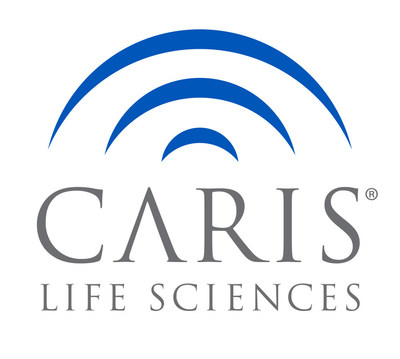Caris Life Sciences Publishes Study Showing AI Signature-positive Breast Cancer Patients Live Almost Twice as Long as AI-negative Patients When Treated with a Checkpoint Inhibitor
PR Newswire
IRVING, Texas, Aug. 6, 2025
Groundbreaking study in Nature Communications highlights AI's role in transforming immunotherapy decisions and precision oncology
IRVING, Texas, Aug. 6, 2025 /PRNewswire/ -- Caris Life Sciences® (NASDAQ: CAI), a leading, patient-centric, next-generation AI TechBio company and precision medicine pioneer, has published a new study in Communications Medicine, a Nature portfolio journal, demonstrating that Caris' AI-based image analysis model has the potential to more accurately predict cancer biomarkers and patient survival than the conventional companion diagnostic (CDx) methods. By analyzing hematoxylin and eosin (H&E) images, the study demonstrated that Caris' AI model can improve the assessment of critical cancer biomarkers and impact patient survival outcomes in breast and colorectal cancers.
For this study, Caris' AI model analyzed data from over 35,000 patients in the Caris clinico-genomic database. In breast cancer, the AI model scored PD-L1 positive phenotype status using an H&E image alone and assessed overall survival of patients treated with pembrolizumab, achieving a hazard ratio (HR) for overall survival of 0.511 (p<0.001), compared to an HR of 0.882 (p>0.1) for traditionally scored PD-L1 IHCs, a result consistent with an almost doubling of overall survival for patients treated with pembrolizumab. In colorectal cancer, AI predicted mismatch repair deficiency (MMRd) and microsatellite instability (MSI) equivalent to traditional scoring.
"Traditional PD-L1 testing can undercall positive cases, especially near the 1% threshold," said Matthew Oberley, MD, PhD, SVP, Chief Clinical Officer and Pathologist-in-Chief at Caris. "Caris' AI model enhances predictive accuracy, integrating features from both staining methods, and exhibits superior prognostic precision compared to current biomarker assessments. Clinical adoption of this tool could improve the precision and efficiency of cancer patient evaluation and aid clinical decision making."
"This study highlights how AI can significantly improve the accuracy and efficiency of tissue sample evaluation, and down the line, this has the potential to guide immunotherapy decisions and enhance patient outcomes," said George W. Sledge, Jr., MD, Caris EVP and Chief Medical Officer.
The publication can be viewed in its entirety on the Caris Life Sciences website.
About Caris Life Sciences
Caris Life Sciences® (Caris) is a leading, patient-centric, next-generation AI TechBio company and precision medicine pioneer that is actively developing and commercializing innovative solutions to transform healthcare. Through comprehensive molecular profiling (Whole Exome and Whole Transcriptome Sequencing) and the application of advanced AI and machine learning algorithms at scale, Caris has created the large-scale, multimodal clinico-genomic database and computing capability needed to analyze and further unravel the molecular complexity of disease. This convergence of next-generation sequencing, AI and machine learning technologies, and high-performance computing provides a differentiated platform to develop the latest generation of advanced precision medicine diagnostic solutions for early detection, diagnosis, monitoring, therapy selection and drug development.
Caris was founded with the belief and vision that combining a vast set of consistently generated molecular information with robust data-driven insights could realize the potential of precision medicine for patients. Headquartered in Irving, Texas, Caris has offices in Phoenix, New York, Cambridge (MA), Tokyo, Japan and Basel, Switzerland. Caris or its distributor partners provide services in the U.S. and other international markets.
Forward Looking Statements
This press release contains forward-looking statements, within the meaning of the federal securities laws, about Caris Life Sciences and its business. All statements other than statements of historical facts contained in this press release are forward-looking statements. In some cases forward-looking statements can be identified by words such as "may," "will," "should," "would," "expect," "plan," "anticipate," "could," "intend," "target," "project," "potential," "contemplate," "believe," "estimate," "predict," "potential," "supports" or "continue" or similar expressions.
You should not rely upon forward-looking statements as predictions of future events. Although we believe that the expectations reflected in these forward-looking statements are reasonable based on information currently available to us, we cannot guarantee that the future results, discoveries, levels of activity, performance or events and circumstances reflected in forward-looking statements will be achieved or occur. Forward-looking statements involve known and unknown risks and uncertainties, some of which are beyond our control. Risks and uncertainties that could cause our actual results to differ materially from those indicated or implied by the forward-looking statements in this press release include, among other things: developments in the precision oncology industry; future financial performance, results of operations or other operational results or metrics; development, validation and timing of future solutions; the rapidly evolving competitive environment in which we operate; third-party payer reimbursement and coverage decisions; our ability to protect and enhance our intellectual property; regulatory requirements, decisions or approvals (including the timing and conditions thereof) related to our solutions; our compliance with laws and regulations; and our ability to hire and retain key personnel as well as risks, uncertainties, and other factors described in the section titled "Risk Factors" and elsewhere in the prospectus for our initial public offering filed with the Securities and Exchange Commission on June 20, 2025, and in our other filings we make with the SEC from time to time. We undertake no obligation to update any forward-looking statements to reflect changes in events, circumstances or our beliefs after the date of this press release, except as required by law.
Caris Life Sciences Media:
Corporate Communications
CorpComm@CarisLS.com
214.294.5606
![]() View original content to download multimedia:https://www.prnewswire.com/news-releases/caris-life-sciences-publishes-study-showing-ai-signature-positive-breast-cancer-patients-live-almost-twice-as-long-as-ai-negative-patients-when-treated-with-a-checkpoint-inhibitor-302522639.html
View original content to download multimedia:https://www.prnewswire.com/news-releases/caris-life-sciences-publishes-study-showing-ai-signature-positive-breast-cancer-patients-live-almost-twice-as-long-as-ai-negative-patients-when-treated-with-a-checkpoint-inhibitor-302522639.html
SOURCE Caris Life Sciences


